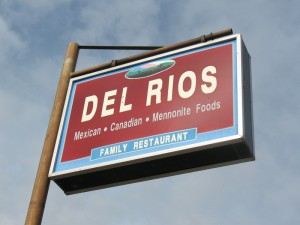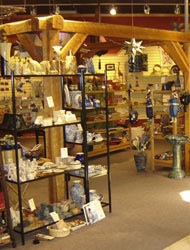The sole purpose of this trip was to take possession of our brand new Freedom II Serenity motor home. We hadn’t expected the trip to Manitoba to have a tourist side to it. Located about 20 miles from the US/Canadian Border, Winkler, Manitoba isn’t generally known as a major travel destination, especially one with a South of the Border flavor!

Del Rios Restaurant
Imagine our surprise when we had lunch the first day at Del Rios, a restaurant boasting Mexican, Canadian and Mennonite cuisine. I was delighted with my beef tacos and Manny savored his ranchero steak platter and fresh corn tortillas —in Manitoba, Canada!
We later learned that a large percentage of Winkler’s enormous Mennonite population is from Chihuahua, Mexico. They brought with them not only genuine Mexican cuisine, but a real Mexican grocery store, “Sunny Days”, one of the largest distributors of authentic Mexican food in Manitoba. It was well-stocked with typical Mexican products like salsas, soft drinks, chips, dried and canned chiles, potato chips, cookies, and other snacks, and an enormous supply of freshly roasted nuts such as sunflower seeds (no-salt, salted, seasoned), pistachios, pumpkin seeds and huge burlap sacks of at least six different roasts of peanuts. The walls were lined with large plastic dispensers of every nut imaginable from pine nuts to walnuts. The refrigerator contained home made beef and chicken flautas, pork and chicken tamales, burritos and fresh tortillas. As you can imagine, our 1 cu. ft. motor home freezer is overflowing with Mexican delicacies.
Besides the Mexican Mennonites in Winkler and neighboring Morden, there is a large Mennonite population in Manitoba who originally emigrated from central Europe. From the inception of their religion during the Reformation in the 16th century, Mennonites throughout the world have experienced religious persecution and have fled from country to country to preserve their beliefs. According to the North Dakota State University Library, the Germans from Russia Heritage Collection states that in the 1870’s, a large contingent of Russian Mennonites were invited to a banquet in Manitoba. Canada’s west was still sparsely populated. Manitoba was looking for appropriate pioneers, while the German-speaking Russian Mennonites were looking for suitable land to settle. Russia had just introduced a compulsory military service law. The Mennonites, who are strictly non-violent, were prepared to leave their country rather than have their young men serve in the army. As a sign of respect at this fateful meeting, the German flag was flown next to the Union Jack, and the Mennonite delegation was told that Queen Victoria often spoke German to her children.
The Mennonites brought with them the northern European tradition of the house-barn structure.

House-barn
Although this unique architectural phenomenon has all but disappeared, due to the dwellings being fire hazards, we saw some wonderful examples of the dual-purpose buildings in Halbstad.
Manny and I also had an opportunity to experience some traditional Mennonite cooking. Don and Rosie Klassen treated us to dinner at their favorite eatery, the Triangle Oasis Restaurant. Knowing we would never get it right by ourselves, Don insisted on ordering for us. This time the German influence was particularly evident. We started with homemade chicken noodle soup —heavy on the noodles— then shared Verenejke, which are cottage cheese perogies (dumplings) smothered in a rich cream sauce, and Kielke, a dish of home made wide egg noodles, topped with more cream gravy. Definitely off the Weight-Watcher point chart, but delicious!
I knew that Ten Thousand Villages, the non-profit Fair Trade organization that markets handcrafted products made by artisans from around the world —the third world, to be precise— is owned by the Mennonite Central Committee, so I asked Rosie if there were any of the 51 TTV Canadian stores in the area. “Right across the street,” she smiled.

Ten Thousand Villages in Winkler
Since we needed some good coffee and dark chocolate, and wanting to compare this store to its American sisters, we went into the Southland Mall, where we entered the world of vibrant colors, scents and textures of fairly traded, handcrafted products from around the globe. We were welcomed with the same warmth as in the Baltimore store where I used to volunteer. Manny and I did our fair share to support several of the 120 artisan groups that sell their work to this wonderful organization.


